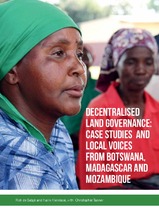| dc.contributor.author | Kleinbooi, Karin | |
| dc.contributor.author | de Satgé, Rick | |
| dc.contributor.author | Tanner, Christopher | |
| dc.date.accessioned | 2019-03-20T12:35:10Z | |
| dc.date.available | 2019-03-20T12:35:10Z | |
| dc.date.issued | 2011 | |
| dc.identifier.citation | Kleinbooi, K. et al. (2011). Decentralised land governance: Case studies and local voices from Botswana, Madagascar and Mozambique. Cape Town: Institute for Poverty Land and Agrarian Studies (PLAAS) University of the Western Cape. | en_US |
| dc.identifier.isbn | 978-1-86808-725-9 | |
| dc.identifier.uri | http://hdl.handle.net/10566/4574 | |
| dc.description.abstract | Decentralisation has been on the Southern African development
agenda for a long time. It is a concept which
appears deceptively simple. The principle of subsidiarity
holds that decision making about local development
priorities needs to take place as close to the people
locally involved as possible. Decision making about land
access and resource allocation is a key component of a
broader decentralisation agenda.
However, on closer examination, discourses around
decentralisation are complex. They combine preand
post colonial histories, changing development
trajectories, and understandings about tenure and
governance systems. They are set against major shifts
in global and local balances of power and fast changing
socio-economic relations which further marginalise the
poor and deepen inequality. | en_US |
| dc.language.iso | en | en_US |
| dc.publisher | Institute for Poverty, Land and Agrarian Studies, University of the Western Cape | en_US |
| dc.subject | Land Governance | en_US |
| dc.subject | Botswana | en_US |
| dc.subject | Madagascar | en_US |
| dc.subject | Mozambique | en_US |
| dc.subject | Local development | en_US |
| dc.subject | Rural land | en_US |
| dc.title | Decentralised land governance: Case studies and local voices from Botswana, Madagascar and Mozambique | en_US |
| dc.type | Book | en_US |

